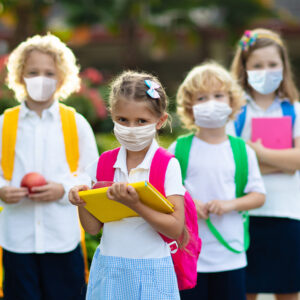In late July, Randi Weingarten, president of the American Federation of Teachers (AFT), said, “We’re going to try to open up schools, and we’re going to move through this political battlefield.”
Since the beginning of the pandemic, powerful teacher unions like the AFT and National Educator Association have played politics, putting their interests first, while millions of children suffer the consequences.
This must end. After all, throughout the pandemic, the nation’s private schools (for the most part) were open for in-person learning.
With the first day of school right around the corner, here are some commonsense tips that prioritize the interests of students, not teacher unions.
First, all schools should be open for full in-person learning this fall. As a former public high school teacher, I know how superior in-person learning is compared to remote learning.
There is no substitute for in-person education. According to a 2020 poll, “A majority of teens (59 percent) say that online learning is worse than in-person schooling, with 19 percent characterizing it as ‘much worse.’”
Per the poll’s chief research officer, “More than any other issue, teens point to remote learning as their biggest academic challenge this fall … So much of the national conversation on virtual schooling focuses on the burden it places on parents and corresponding losses in workplace productivity, but it’s possible that the day-to-day impact on students that will have longer-term implications.”
The benefits of in-person learning extend far beyond the academic realm. Children need to be around other children to develop socialization skills as well as peer relationships.
Second, students should not be forced to wear masks.
The Centers for Disease Control and Prevention (CDC) recently issued new guidelines recommending all school personnel, including students, wear masks at all times, regardless of vaccination status. This is completely unnecessary.
There is absolutely no need to mandate face masks for vaccinated individuals. And there is even less need for children to wear a face mask for eight hours per day, five days per week.
At this point in the pandemic, we know that the vast majority of children are basically immune to COVID-19. What’s more, we know that children rarely, if ever, transmit the virus.
However, we do know that face masks pose a health threat to children. According to the Children’s Health Defense (CHD), “Studies found face masks cause carbon dioxide rebreathing and hypercapnia (excessive carbon dioxide in the bloodstream) trapping CO2 rich respiratory exhalations at the mask-mouth interface, forcing rebreathing of CO2 rich exhalations, and raising CO2 levels. This is most pronounced in young children.”
As CHD also points out, face masks harm children because “masks lower children’s oxygen levels in the blood” and “chemicals found in face masks are toxic to children.”
What’s more, forcing children to wear face masks inhibits the development of socialization skills because children are unable to read and interpret their peers’ facial expressions.
Aside from the in-person learning and mask issues, another major topic for the upcoming school year is how to address the lack of learning that has occurred over the past year and a half.
During the pandemic, far too many American students fell behind. Per the Horace Mann Educators Corporation, 53 percent of U.S. educators report their students experienced “significant learning loss.” Even worse, 97 percent of educators reported “some learning loss” during the pandemic.
This is particularly important because of the long-term consequences learning loss produces. As any teacher can tell you, learning (especially among young children) requires a scaffolding approach. This means students build upon previous concepts and lessons as they progress towards better understanding and greater independence in their own learning process.
However, because the vast majority of America’s children attend public schools, the learning loss that has occurred over the past 18 months is likely to manifest for years to come. In other words, an entire generation of American students will pay for the selfish, stupid acts of those who are supposed to be their caretakers.
This is particularly sad and unfortunate because it is a direct consequence of teacher unions’ recalcitrance to teach in person.
With schools opening en masse over the next few weeks, it is essential that we get back to basics.
All schools should be open for in-person learning five days per week. Masks should be optional, not mandated. And lastly, measures should be taken to ensure that the learning loss that has occurred during the pandemic is bridged as best as possible.

